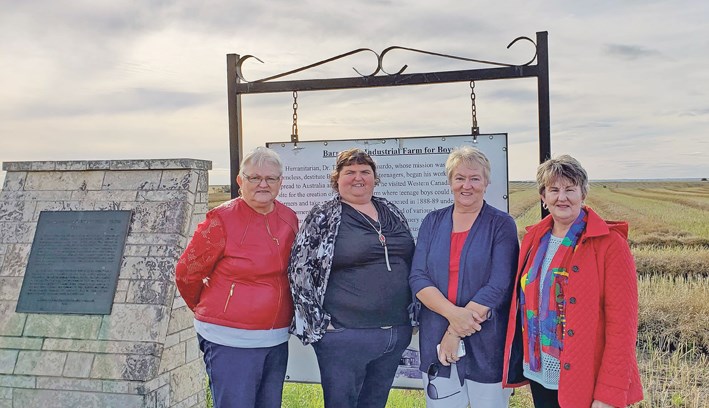For many, the true identity and circumstances of our ancestors has been wrapped in silence. How and why did our great-grandparents come here?
In the last few years and even months, as the truth began to surface regarding the British Home Children, Holly Draper from the Lenore community began digging into ship manifests and records in Great Britain.
Last weekend she told the incredible story of her great-grandmother’s and grandmother’s lives. She recounted a summary, which included stories of her four great uncles at two gatherings where the British Home Children were honoured.
Draper, her Kenton sister Bev Bennett, daughter Sandi Bennett and a Winnipeg sister, Connie Clark attended a celebration in Russell, Saturday, Oct. 28 and in Kenton on Sunday.
Sept. 28 marked the start of a migration that saw more than 100,000 children sent from Britain to Canada between 1869 and the 1930s.
On Sunday, 14 people gathered at Kenton Museum.
About 40 people attended Saturday’s Russell event to share stories of their predecessors, including a group from Elkhorn. “It was an eye opener,” said Draper.
“We had a good presentation. We visited the farm site where the cairn is, Cherry Hill, where the farm manager Mr. Struthers lived and, at dusk, lit candles.”
She said of the 14-section farm, “There were good vibes that came from the people of the Russell area about the training school. It was very well run. The farm manager was very well liked.
“But one lady got up and said that all was not well.” A police officer once told her of a call to the farm. He was shown an underground bunker or dungeon where the children would be placed, in handcuffs, if they misbehaved.
Barnardo had been to Canada in advance of sending boatloads of children. He felt that although there were four receiving homes set up in Winnipeg, he wanted to see the children in rural settings.
Barnardo developed a dairy and a butter business on the Russell property where the Home children were trained to farm. Draper learned that Barnardo became known for a championship product in the butter that was made there.
The training centre was closed and the land sold circa 1920.
“To date, there are no buildings, there, just a monument and plaque,” she said.
From Holly Draper’s BHC presentation
Our great grandparents lived in London, England back in the 1800s. William and Alice Richardson had eight children, five sons and three daughters (daughter Grace died in infancy). They had a comfortable living until William lost their money in some bad business deals.
In 1893-1894 there was a diphtheria epidemic that struck London. A daughter, Kathleen, died in December of 1893 and William (the father) died in February. The family was left destitute and Alice could not support her family. She placed her boys into orphanages under the care of Dr. Barnardo, and her remaining daughter Dorothy (our grandmother) in the Wanstead Infant Orphan Asylum.
Alice went to work in hopes of earning enough money to bring her children home. By the time she had saved enough money to support her family, the boys had all been sent to Canada, the oldest was 14 and the youngest only nine.
In 1907 Alice and Dorothy headed for Canada aboard the S.S. Kensington to re-unite with her boys.
Cyril and Martin were in the Miniota Municipality working on farms as laborers (having first been at the Russell Training Farm). Alice settled into Miniota and with the help of her daughter, Dorothy, ran a rooming house.
The other three boys, Tracy, Reginald and Douglas had been placed in Ontario. Once the boys became of age, they moved on. Cyril was the only one to remain in Canada, the others settled in and around Detroit, Michigan.
Over the next 30 years Alice reconnected with all five of her sons, Dorothy with her brothers, making this one of the “Happy Ending” stories of our British Home Children.




